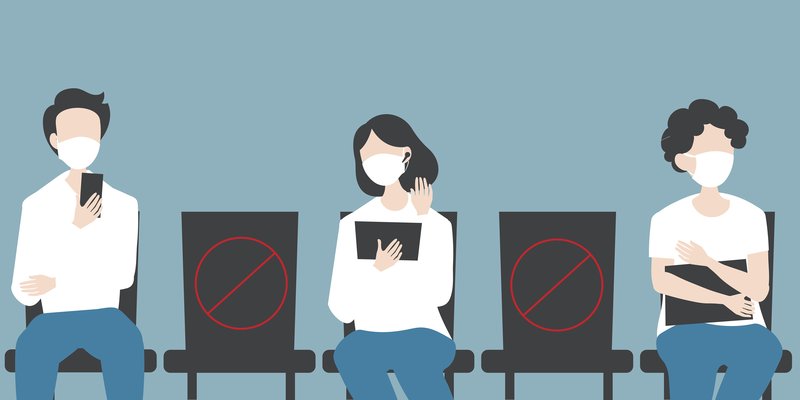Tips for Hospital, Skilled Nursing and LTC in Providing Person Centered Dementia Care Through Covid-19
Since the pandemic of COVID-19, there has been an intense and necessary focus on how to systematically prepare for the imminent stress and strain on the health system that this disease will impact.

Since the pandemic of COVID-19, there has been an intense and necessary focus on how to systematically prepare for the imminent stress and strain on the health system that this disease will impact. Like many illnesses, the Center for Disease Control and Prevention (CDC) states that older adults are at a higher risk of complication and severe illness from Covid-19, therefore the preventative measures and social distancing protocols in older adult care settings and skilled nursing homes are a necessary fore in helping to prevent the spread of the disease. A critical focus has been placed on infection control protocols and physical distancing has become the norm, both necessary, yet challenging in adaptation and implementation for both healthcare employees and the general public. For many, there is now an unmet and unaddressed issue, the fact that patients and clients in care are still in need of social, emotional and intellectual stimulation and compassion. In the implementation of these new structures, and policies, it is imperative that we remember to remain human when caring, in order to better serve and understand our clients who live with dementia or Alzheimer’s Disease.
Take a moment
Imagine you’re in a place you’ve not been before.
You’re not sure how you got there…
No indication why you should be there,
The people are whizzing past you in full medical garb, masks tied tight, these yellow gowns that smell sterile and look like someone is going in for surgery, and gloves pulled wa-a-a-y up their arms.
You don’t feel sick, but why else would someone be wearing something like that? What are they saying? It’s so hard to understand behind those masks, everything is so muffled.
Now, knowing that, take a moment to imagine how you’d feel if you were faced to try to understand this new reality. No doubt there are feelings of being scared, concerned, worried about what someone is trying to do to you. Wondering, what is going on. Those are all feelings that our clients may exhibit through these trying times, and in turn, our clients may react to situations because they’re scared, or they don’t fully understand and comprehend that these protective measures are critical to their health and wellbeing. Recognizing the fear and concern of our clients, and providing reassurance and support to your client while caring for them and working with them through the pandemic can help your client feel more safe and secure, and can make your interactions with your clients more safe and fulfilling for you, too..
So, how exactly do we prepare for isolation, all the while remaining person centered? Here are a few tips that are easy to implement in your daily work:
Communication
You and Your Team

We live in uncertain times and this can cause a great deal of mixed emotions - not only for yourself, but also for your clients or residents and your team. Address the elephant in the room! Talk about how tired or worried you are, each day is changing, and procedures and processes are evolving rapidly, it’s only natural that we struggle to adapt. Be mindful that we each have different methods in which we cope with stress, and therefore be sure to always show respect for others’ feelings. It’s easier to show anger when someone is scared, to challenge colleagues when things are uncertain, and to show rigidity when feeling like things are out of one’s control. Validating one another’s feelings, supporting one another and demonstrating that everyone is in this together will be key to providing good support to your clients and ensure that everything you share with your team is true and accurate. This allows for credibility and trust to be built within your relationships.
You and Your Clients
Human connection is imperative for wellbeing and mental health. Through this trying time, it’s important to follow all policies and protocols set out by the State/Province and the organization in which you are employed. There are ways in which you can continue to maintain your person centered nature throughout the duration of the disease.
If you are social distancing, but not wearing personal protective equipment (PPE), visiting with clients one on one and asking them about their life, relating to the things they love, and sharing in their stories will help to maintain relationships and encourage clients to feel purposeful. Taking a few minutes each day while providing care to discuss important events in the client’s life, their children growing up, the importance of their job, or their beloved pet, will help bring them joy and feel connected to you. Similarly, providing them things to do and opportunities for self-directed activities like going through their photo album in their room or working on a puzzle on their table while distancing, will help the day to go by and keep the boredom (somewhat) at bay. Just like us, our clients are very likely missing the daily buzz and hum of the day to keep them engaged and connected to the community.

If you are using Personal Protective Equipment, it will be even more important, especially while providing care, to speak to your clients with care and concern. Building relationships and trying to make the experience as positive as possible, will help your clients feel more at ease when someone with a mask and gloves is coming toward them to help them with their daily care.
Share stories. Talk about the history of the individual, and encourage interaction and laughter through this trying time.
Speak slowly, and very clearly. It’s hard enough for our clients to hear and comprehend what we’re saying when we don’t have a mask on. Speak loud and clear to help them hear you and give them time to respond.
Maintaining Empathy and Relationships to Your Clients with Dementia & Alzheimer’s Disease
When talking with your clients living with dementia, be conscientious of their needs and how they may be experiencing the environment, recognize the disruption to normal that that this situation provides. Be mindful that it might take longer during this trying time to communicate with your clients. Using the aforementioned communication tips, speak as clearly and slowly as possible to provide space for understanding.
Recognize that due to the changes to the environment, to routines, and possibly, to your appearance, your clients living with dementia may have a more challenging time expressing themselves. Without a bit of due diligence, this may result in a lack of individual awareness of potential symptoms that your client may be experiencing. Providing space and time for your clients to share how they’re feeling and what they’re experiencing is key.
Moreover, when caring for a person living with dementia, it is important to remember that the client isn’t trying to be difficult, but rather they are the ones experiencing difficulty. They may be overwhelmed, uncomfortable, confused and simply unable to communicate what they need.
With the new procedures in place, the little things they became familiar with and accustomed to in their daily routine (e.i. family dining, visitations, etc.) have been taken away from them. This can cause a great deal of confusion and overwhelm for someone living with a cognitive impairment. Therefore, as a caregiver, the need to be empathetic and patient throughout these changes is crucial.
Get Innovative
Just as we are, our loved ones with dementia may be going ‘stir-crazy’. Now is as important as ever, to give yourself the space to try things with your clients. Can you use the iPad or tablet to pull up music videos from the past, or use zoom to connect with the music therapist, try puzzles, often the 200 piece puzzles work well. Are there apps that you can research for your clients to use? Can you take residents and patients on a walk through the Smithsonian, or the Louvre by accessing their ‘virtual tour’ feature? Use google to find pictures from a certain time period and place. Set up phone calls and Skype calls for social interactions with loved ones. Encourage staff to take leadership roles if that is of their interest and provide them the latitude to provide good social care while maintaining medical care - this is especially helpful while not in an active outbreak situation.
It is critical that infection control practices are held in the highest regard and utilized when using engagement items with clients.
Hand Washing

Getting your clients to wash their hands for 20 seconds can be a challenge, particularly for people living with dementia who have a sensitivity to water. Use a soothing voice, especially while under PPE measures, but be sure to avoid using infantile language or patterns. To make the hand washing process a more pleasant experience, try these simple but effective suggestions:
- Use a calming voice to introduce the idea of cleaning their hands.
- Play calming music the client enjoys and sing with them if this is something they enjoy.
- Communicate to the client each step you take throughout the process - do not assume the person knows what the next step is.
- Use warm water and a soap with a fragrance they enjoy or is familiar to them.
- If at any point the client finds the experience upsetting or is unable to wash for the full 20 seconds, use hand sanitizer, which will be effective until the hand washing can be reintroduced.
- If using the sink is overwhelming or if there are physical barriers to using it, moisten a hand cloth with warm water and soap, and proceed to massage the person's hands until clean. Follow with a warm plain water cloth to rinse, or if able, use rinse less shampoo!
Keeping Connections

Social distancing does not mean social isolation. Think of it this way, physical distance/social connection. Be sure to continue reaching out to your loved ones living with dementia - something as simple as a phone call, Facetime, or Skype call can be very powerful to stay connected. While we have all seen the news stories of individuals communicating with their loved one outside a window, for persons living with dementia, this can be very confusing, hard for them to process, and may cause a responsive behavior.
This is a challenging time for all of us, staying connected is indeed a challenge; but it is imperative that we do just that and identify ways to mitigate imposed loneliness for one another. Social support is also important for caregivers during this time. Respite trips may be cut or eliminated, support groups may be disbanded and families being able to support care may be drastically reduced. Encourage caregivers to stay connected, call them frequently, assist in establishing virtual support groups, deliveries of food and other services they may need.
If you are supporting a caregiver, be sure that they are connected to telemedicine for routine provider connections or non-urgent care that does not require emergency room.
Looking for direction and practical tips for providing person centered dementia care through the Covid-19 Pandemic? Join Planetree International and Person Centered Universe Inc. on April 6th 1pm EST via Zoom!
